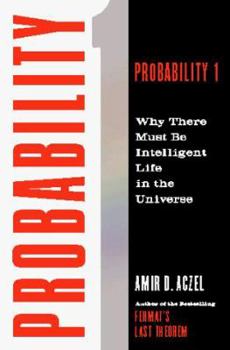Probability 1
Select Format
Select Condition 
Book Overview
For thousands of years, it was the visionaries and writers who argued that we cannot be alone-that there is intellegent life in the universe. Now, with the discoveries of the Hubble Telescope, data... This description may be from another edition of this product.
Format:Hardcover
Language:English
ISBN:0151003769
ISBN13:9780151003761
Release Date:September 1998
Publisher:Houghton Mifflin
Length:240 Pages
Weight:0.97 lbs.
Dimensions:0.9" x 5.7" x 8.5"
Customer Reviews
5 ratings
A safe bet if ever there was one
Published by Thriftbooks.com User , 15 years ago
Our galaxy is one hundred and fifty thousand light years across. It is a distance so vast it would take light one hundred and fifty thousand years to cross. Our observable universe is ninety seven billion light years across. It is a distance so vast it would take light ninety seven billion light years to cross. There is no way we can no prove how large the universe itself is. Stated another way, there is no way for us to determine just how much more out there is out there past those ninety seven billion light years which make up the observable universe. While it is true that a legion of brilliant minds have suggested that the presence of life and intelligent life elsewhere in the universe is exceedingly small (see Peter Ward, Freeman Dyson and Fred Hoyle) it is also true that even with any non zero number a sufficient amount of space, galaxies and stars will eventually prove that the chances of intelligent life given that exceedingly small number still result in, as Mr. Aczel indicates, a probability of one for the presence of intelligent life elsewhere in the universe. The question then is the probability of the existence of intelligent life elsewhere in the universe but rather the possibility that we may someday become aware of the existence of that intelligent life and conversely that it becomes aware of us. By way of illustration, if there is only one other intelligent civilization in the universe and it is more than ninety billion light years away we will not have contact with it. Conversely, if a similar size star could be found with similar properties to our sun within an accessible region of our own galaxy then the chances of contact rise proportional to the proximity of that star/civilization to our own Earth. With all due respect to the luminaries who've weighed in on both sides of this issue, I personally believe that the jury remains out on that latter scenario. Though it's true that ultimately our longevity and science will answer this question, it's also true that time and patience will play their part as well. In the meantime, it's entirely proper for us to keep our eyes on the stars and the great cosmos abyss which itself sired us.
An excellent, thought provoking book.
Published by Thriftbooks.com User , 22 years ago
I first read this book a couple years ago, when I picked it up off of a Borders Bargain Book Rack for 5 or 6 bucks. Since then, I have read, and re-read it several times. It is highly thought provoking and jam-packed with scientific information.From a brief explanation of the search for planets outside of our solar system, through a detailed explanation of Drake's Equation (the equation which the entire books is based around), and explanations on how it works, it explains how physicists and astronomers have come to the stunning conclusion that there must be life --intelligent life-- elsewhere in the Universe. What it all boils down to is this: Using even the smallest possible estimates for the number of stars in the univers, and the smallest chance of those stars having planets, the probability that *intelligent* life must exist outside of our solar system is a number indistinguishable from One to any level of decimal accuracy. And if there are infinetly many stars in the universe (as some astronomers believe), then the number *IS* ONE, and not a number indistinguishable from it.If you have any intrest in the possibility for extraterrestrial life, read this book. It is highly thought provoking, exciting, and well worth the time!
good read
Published by Thriftbooks.com User , 23 years ago
A good read that gets your mind moving.
A very good and readable book
Published by Thriftbooks.com User , 25 years ago
I like the way Mr.Aczel writes and the Probability I is an excellent book, and I have suggested this book to several people inclusive but not limited to the Sagan-Feynman discussion list.
I found this book to be very enjoyable and informative
Published by Thriftbooks.com User , 26 years ago
This is a lively and fast-paced account of the ongoing search for the answer to one of the universal questions of mankind-is there life beyond our planet. Amir Aczel is a master story teller, weaving historical narrative with the words of present-day scientific detectives searching for the illusive signs of life in the universe. Through the vignettes that make up the heart of this book, I felt the excitement experienced by those scientists trying to piece together the puzzle of what is life and where might it exist. The book builds a mosaic of facts bearing on the existence of extra-terrestrial life, using puzzle pieces from such diverse scientific disciplines as astronomy, biology, chemistry, archeology, physics, geology, and mathematics. Each contribution is put into historical perspective and then carefully explained in understandable language. This is quite a remarkable literary feat, given the breadth and complexity of the subject matter. But most of all, the book maintained my interest throughout with its mixture of scientific explanation, historical background, and personal accounts of the major scientific players in this quest for the signs of life. Dr. Aczel has again taken a complex topic and written an enjoyable, informative and highly readable book. I highly recommend this book, with probability 1.





